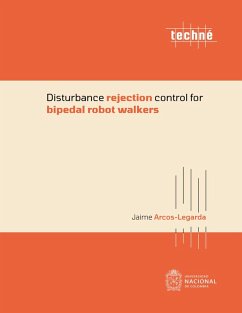This dissertation contributes to the theoretical and experimental foundation of disturbance rejection control in dynamic bipedal robots. Disturbances produced by model uncertainties and external disturbances are studied as lumped signals that can be rejected through feedback control techniques. The disturbance rejection problem is addressed with the design of trajectory tracking controllers working complementary with an adaptive reference trajectory generator. Two trajectory tracking control strategies were developed: (i) a novel model-based active disturbance rejection control and (ii) a robust multivariable generalized proportional integral control. The methodology adopted allows the design of trajectory generators with the ability to produce periodic stable gait patterns and reject disturbances through the use of an adaptive reference trajectory generator. A discrete control action resets the gait trajectory references after the impact produced by the robot's support-leg exchange in order to maintain a zero tracking error in the controlled joints. In addition, an extended hybrid zero dynamics is introduced to examine the periodic stability of the system with the use of a lower-dimensional representation of the full hybrid dynamics with uncertainties. A physical bipedal robot testbed, named as Saurian, was fabricated for validation purposes. Numerical simulation and physical experiments show the robustness of the proposed control strategies against external disturbances and model uncertainties that could affect both the swing motion phase and the support-leg exchange.
Dieser Download kann aus rechtlichen Gründen nur mit Rechnungsadresse in A, B, BG, CY, CZ, D, DK, EW, E, FIN, F, GR, H, IRL, I, LT, L, LR, M, NL, PL, P, R, S, SLO, SK ausgeliefert werden.









